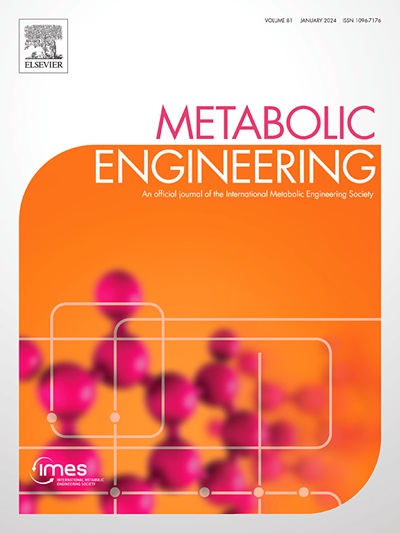Awakening of the RuMP cycle for partial methylotrophy in the thermophile Parageobacillus thermoglucosidasius
IF 6.8
1区 生物学
Q1 BIOTECHNOLOGY & APPLIED MICROBIOLOGY
引用次数: 0
Abstract
Given sustainability and scalability concerns of using sugar feedstocks for microbial bioproduction of bulk chemicals, widening the feedstock range for microbial cell factories is of high interest. Methanol is a one-carbon alcohol that stands out as an alternative feedstock for the bioproduction of chemicals, as it is electron-rich, water-miscible and can be produced from several renewable resources. Bioconversion of methanol into products under thermophilic conditions (>50 °C) could be highly advantageous for industrial biotechnology. Although progress is being made with natural, thermophilic methylotrophic microorganisms, they are not yet optimal for bioproduction and establishing alternative thermophilic methylotrophic bioproduction platforms can widen possibilities. Hence, we set out to implement methanol assimilation in the emerging thermophilic model organism Parageobacillus thermoglucosidasius. We engineered P. thermoglucosidasius to be strictly dependent for its growth on methanol assimilation via the core of the highly efficient ribulose monophosphate (RuMP) cycle, while co-assimilating ribose. Surprisingly, this did not require heterologous expression of RuMP enzymes. Instead, by laboratory evolution we awakened latent, native enzyme activities to form the core of the RuMP cycle. We obtained fast methylotrophic growth in which ∼17 % of biomass was strictly obtained from methanol. This work lays the foundation for developing a versatile thermophilic bioproduction platform based on renewable methanol.
嗜热嗜糖副杆菌部分甲基化的RuMP循环的觉醒
考虑到使用糖原料进行大宗化学品微生物生物生产的可持续性和可扩展性问题,扩大微生物细胞工厂的原料范围具有很高的兴趣。甲醇是一种单碳醇,因为它富含电子,与水混溶,并且可以从几种可再生资源中生产,因此作为生物生产化学品的替代原料脱颖而出。在嗜热条件下(50°C)将甲醇生物转化为产品对工业生物技术非常有利。尽管天然的嗜热甲基化营养微生物正在取得进展,但它们还不是生物生产的最佳选择,建立替代的嗜热甲基化营养生物生产平台可以扩大可能性。因此,我们着手在新兴的嗜热模式生物热葡萄共生副杆菌中实施甲醇同化。我们设计了P. thermoglucosidasius,使其生长严格依赖于通过高效单磷酸核酮糖(RuMP)循环的核心甲醇同化,同时共同化核糖。令人惊讶的是,这并不需要RuMP酶的异种表达。相反,通过实验室进化,我们唤醒了潜在的天然酶活性,形成了RuMP循环的核心。我们获得了快速的甲基营养生长,其中约17%的生物质严格地从甲醇中获得。这项工作为开发基于可再生甲醇的多功能嗜热生物生产平台奠定了基础。
本文章由计算机程序翻译,如有差异,请以英文原文为准。
求助全文
约1分钟内获得全文
求助全文
来源期刊

Metabolic engineering
工程技术-生物工程与应用微生物
CiteScore
15.60
自引率
6.00%
发文量
140
审稿时长
44 days
期刊介绍:
Metabolic Engineering (MBE) is a journal that focuses on publishing original research papers on the directed modulation of metabolic pathways for metabolite overproduction or the enhancement of cellular properties. It welcomes papers that describe the engineering of native pathways and the synthesis of heterologous pathways to convert microorganisms into microbial cell factories. The journal covers experimental, computational, and modeling approaches for understanding metabolic pathways and manipulating them through genetic, media, or environmental means. Effective exploration of metabolic pathways necessitates the use of molecular biology and biochemistry methods, as well as engineering techniques for modeling and data analysis. MBE serves as a platform for interdisciplinary research in fields such as biochemistry, molecular biology, applied microbiology, cellular physiology, cellular nutrition in health and disease, and biochemical engineering. The journal publishes various types of papers, including original research papers and review papers. It is indexed and abstracted in databases such as Scopus, Embase, EMBiology, Current Contents - Life Sciences and Clinical Medicine, Science Citation Index, PubMed/Medline, CAS and Biotechnology Citation Index.
 求助内容:
求助内容: 应助结果提醒方式:
应助结果提醒方式:


